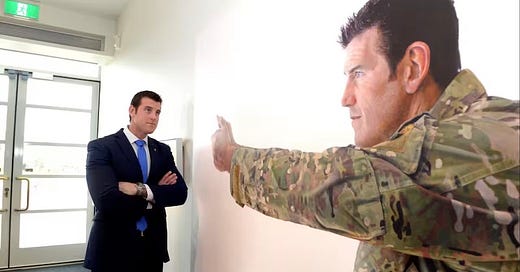In a high-profile defamation case that captivated the nation, the release of findings in the Ben Roberts-Smith trial has sent shockwaves through Australia. The evidence presented during the trial, which involved major media outlets, war crimes, domestic violence accusations, and the intervention of influential figures, has exposed a dark underbelly of the Australian military’s actions in Afghanistan and tarnished the reputation of a once-revered war hero.
The trial centred around the publications by Nine Media in The Age, Sydney Morning Herald, and the Canberra Times, which alleged that Roberts-Smith had committed heinous acts during his service in Afghanistan. The court’s findings, based on the balance of probabilities, validated the veracity of these claims, including the disturbing revelation of four murders of civilians, the coercion of fellow soldiers to execute a prisoner, and the appalling act of kicking an unarmed handcuffed Afghan villager off a cliff.
Moreover, the court also found that Roberts-Smith had lied about his threatening behaviours towards a woman with whom he was having an affair, implicating him in domestic violence accusations.
An expensive defamation case
This trial encompassed a wide range of contentious issues, including war crimes, the conduct of the Special Air Service (SAS) overseas, and the involvement of a Victoria Cross recipient who holds a significant presence at the Australian War Memorial in Canberra. The case also took on the dimensions of a battle between media owners, with Kerry Stokes, owner of Seven West Media, financing the substantial $25 million legal costs in support of Roberts-Smith.
The trial’s outcome dealt a severe blow to Roberts-Smith’s reputation, leaving it irreparably damaged. Moreover, it has opened the floodgates for the potential revelation of further war crimes committed in Afghanistan, amplifying concerns over the actions of the Australian military during its deployment.
Some have argued that if Roberts-Smith had remained silent about the damning evidence published by Nine Media, the public might have eventually forgotten about these allegations, and his reputation would have remained intact. However, the crucial point is not about reputation management but rather the pursuit of justice. Regardless of the misguided nature of the defamation case, it successfully brought the truth to light, unmasking a deeply flawed and morally questionable individual.
Public interest journalism
Credit must be given to the journalists involved in uncovering and reporting on this story. Nick McKenzie and Chris Masters, through their relentless investigative journalism, showcased exemplary work under immense pressure. While mainstream media often draws criticism for its shortcomings, the quality of their reporting in this case deserves recognition. It demonstrated the importance of holding powerful individuals accountable and exposing the truth, even in the face of resistance.
Critics of Roberts-Smith have contended that the evidence against him should not be dismissed simply because outsiders were not present on the battlefield. The evidence provided in court did not stem from inexperienced journalists making assumptions but rather from combatants who were present during the incidents and were able to compare behaviours in harrowing circumstances. Their testimonies overwhelmingly pointed to wrongdoing, lending credibility to the court’s findings.
Notably, the trial also witnessed the involvement of other media outlets, such as News Corporation, which offered support to Roberts-Smith while denigrating the soldiers who testified against him. They propagated the notion that only those who had experienced combat could judge Roberts-Smith’s actions.
However, it is important to acknowledge that criticisms can be made by individuals who have not been in combat. The military operates under a rules-based order, and certain actions, such as killing civilians and non-combatants, constitute war crimes. While such crimes often go unpunished, this case serves as a reminder that accountability should prevail when evidence is presented.
The trial also exposed the flaws in the defamation laws of Australia, which have traditionally protected powerful individuals. In this instance, the legal process allowed crucial information about potential war crimes to enter the public domain. Though unintentional, Roberts-Smith inadvertently played a role in bringing these allegations to light.
A reassessment of Australia’s hero worshipping
The trial shed light on the dynamics within the regiment and how Roberts-Smith’s perception of support from his colleagues proved unfounded. Given his familial ties to another high-ranking Australian soldier – his father – Roberts-Smith was seen by some as highly privileged, potentially granted access and privileges not extended to others. While this perception may be subjective, it highlights broader issues within Australia, including the acceptability of certain behaviours and the need for a reassessment of how military veterans are cared for and revered. It challenges the notion of hero worship and reminds us that even those hailed as battle heroes can possess significant flaws.
Ultimately, the trial’s outcome reinforces the importance of listening to those with firsthand knowledge and experience. When individuals who were present on the ground and witnessed Roberts-Smith’s actions attest to their inappropriateness, their voices must be heard. This trial has not only brought justice to those who acted with integrity but also exposed a disturbing chapter in Australia’s military history that demands reflection and change.





